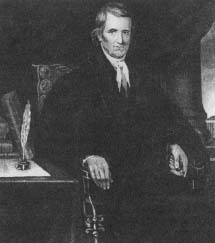Marbury v. Madison: 1803
Marshall Proclaims The Doctrine Of Judicial Review
On February 24, 1803, Chief Justice Marshall issued the Court's opinion. He proceeded in three steps.
First, he reviewed the facts of the case. He stated that Marbury had the right to receive his commission:
To withhold his commission, therefore, is an act deemed by the court not warranted by law, but violative of a vested right.
Second, Marshall analyzed Marbury's legal remedies. He concluded that the Judiciary Act clearly entitled Marbury to the writ of mandamus he requested.
Marshall's third and final question, therefore, was whether the writ of mandamus could be issued by the Supreme Court. Although the Judiciary Act would allow the Court to issue the writ, Marshall was concerned about the Court's authority under Article III, Section 2, Paragraph 2 of the U.S. Constitution, which states:
In all cases affecting ambassadors, other public ministers and consuls, and those in which a State shall be a Party, the Supreme Court shall have original jurisdiction. In all other cases … Supreme Court shall have appellate jurisdiction.…
If the Court didn't have original jurisdiction—the responsibility for hearing the evidence and making an initial decision—then under the Constitution, Marbury couldn't go directly to it to get his requested writ of mandamus. He would have to go to a federal District Court, and only if he lost there could he then appeal to the Supreme
 Engraving of Chief Justice John Marshall with Supreme Court building in the distance..
Engraving of Chief Justice John Marshall with Supreme Court building in the distance..
To enable this court, then, to issue a mandamus, it must be shown to be an exercise of appellate jurisdiction.…
Marshall now addressed the critical question: Would the court use the authority that the Judiciary Act granted it, but that the Constitution denied it, to issue Marbury's writ of mandamus?
Marshall said no, it would not. No act of Congress, including the Judiciary Act, could do something forbidden by the Constitution:
Certainly all those who have framed written constitutions contemplate them as forming the fundamental and paramount law of the nation, and consequently, the theory of every such government must be, that an act of the legislature, repugnant to the constitution, is void.
Therefore, because the Judiciary Act violated the Constitution, it was unenforceable. Marbury and the others could not get their writ of mandamus from the Court because their petition had been sent to the Court directly, not on appeal. In declaring the Judiciary Act unconstitutional, Marshall set forth for the first time the doctrine of judicial review. Judicial review means that the federal courts, above all the Supreme Court, have the power to declare laws unenforceable if they violate the Constitution:
It is emphatically the province and duty of the judicial department to say what the law is. Those who apply the rule to particular cases must of necessity expound and interpret the rule. If two laws conflict with each other, the courts must decide on the operation of each.
Marshall's decision meant that the Court would not give his fellow Federalist Marbury the writ of mandamus. Nevertheless, it was a brilliant move. In refusing to confront Jefferson, Marshall had asserted a new and potent power for the judiciary, namely the doctrine of judicial review. Despite various issues, such as whether Marshall should have removed himself from the case because of his role as Adams' secretary of state, Marbuty v. Madison permanently established the principle of judicial review. This power to overturn unconstitutional laws is the basis for the courts' power today to prevent such evils as civil rights violations.
—Stephen C. Christianson
Suggestions for Further Reading
Baker, Leonard. John Marshall: A Life in Law. New York: Macmillan Co., 1974.
Berger, Raoul. Congress v. the Supreme Court. Cambridge: Harvard University Press, 1969.
Beveridge, Albert J. The Life of John Marshall. Marietta, Ga.: Cherokee Publishing, 1990.
Bickel, Alexander M. The Least Dangerous Branch: the Supreme Court at the Bar of Politics. New Haven: Yale University Press, 1986.
Cusack, Michael. "America's Greatest Justice?" Scholastic Update (January 1990): 11.
Ellis, Richard E. The Jeffersonian Crisis: Courts and Politics in the Young Republic. New York: Oxford University Press, 1971.
Levy, Leonard Williams. Judicial Review, and the Supreme Court. New York: Harper & Row, 1967.
McHugh, Clare. "The Story of the Constitution: Conflict and Promise." Scholastic Update (September 1987): 8-11.
Warren, Charles. The Supreme Court in United States History. Littleton, Colo.: F.B. Rothman, 1987.
Additional topics
- Marbury v. Madison: 1803 - Suggestions For Further Reading
- Marbury v. Madison: 1803 - Marbury Goes To Court
- Other Free Encyclopedias
Law Library - American Law and Legal InformationNotable Trials and Court Cases - 1637 to 1832Marbury v. Madison: 1803 - Marbury Goes To Court, Marshall Proclaims The Doctrine Of Judicial Review, Suggestions For Further Reading